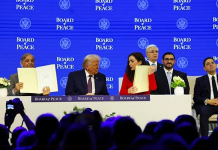ISLAMABAD, MAR 27 (APP/DNA):In a significant push toward economic revitalization, Pakistan’s leading regulatory bodies are emerging as central players in driving business competitiveness and restoring investor confidence.
Key institutions including the Competition Commission of Pakistan (CCP), the Federal Board of Revenue (FBR), the State Bank of Pakistan (SBP), and the Securities and Exchange Commission of Pakistan (SECP) are implementing wide ranging reforms aimed at fostering transparency, accountability, and growth in the national economy.
Under the leadership of Dr. Kabir Sidhu, the Competition Commission of Pakistan has undergone a notable transformation, asserting itself as a proactive regulator focused on ensuring fair market practices.
The CCP has taken decisive action against monopolistic behaviors and deceptive marketing strategies, recovering significant penalties over the past year.
The Commission has also overseen several key merger cases, closely scrutinizing transactions to prevent anti-competitive consolidation. Additionally, penalties imposed on misleading advertising practices have served as a warning to violators, reaffirming the CCP’s commitment to market integrity.
Beyond enforcement, the CCP has launched extensive awareness campaigns to educate businesses on compliance obligations, fostering a culture of ethical conduct.
However, experts stress that for the CCP to fulfill its mandate effectively, it needs greater institutional support in terms of authority and resources.
Dr. Sidhu’s vision emphasizes strengthening the CCP’s role as a catalyst for competitive markets that attract both local and international investment.
The Federal Board of Revenue has embarked on an ambitious agenda to overhaul Pakistan’s tax framework, most notably by targeting the elimination of the non-filer category. This longstanding loophole has enabled vast amounts of undeclared wealth to escape taxation. While the move signals a commitment to transparency, it has faced pushback from vested interests within government and the FBR itself.
To support economic activity, particularly in the export sector, the FBR recently cleared substantial pending tax refunds, injecting much-needed liquidity into the economy.
Additionally, efforts are underway to simplify the tax filing process especially for individuals and small businesses while digitizing internal operations to reduce human interference and corruption.
Despite its 20,000-strong workforce, experts argue that only a technologically empowered FBR can truly broaden the tax net and foster voluntary compliance in the long term.
The State Bank of Pakistan has played a vital role in stabilizing the financial sector amidst recent economic headwinds. By adopting prudent monetary policies, the SBP has managed to bring down inflation and gradually reduce interest rates, making borrowing more accessible for businesses and individuals.
These steps have led to a revival in stock market activity and renewed optimism among domestic and foreign investors.
Moreover, the SBP’s initiatives to promote financial inclusion through digital banking and fintech platforms have widened access to banking services, especially for underserved communities.
Special focus has also been placed on supporting small and medium enterprises (SMEs), which are considered the backbone of economic development and employment generation.
The Securities and Exchange Commission of Pakistan continues to play a critical role in regulating capital markets and enhancing the ease of doing business. However, its recent tightening of regulations for Non-Banking Financial Companies (NBFCs) has drawn criticism from stakeholders, particularly Chinese investors, who have scaled back investments due to the restrictive framework.
While investor protection and compliance are vital, critics argue that overregulation may deter innovation and discourage new business formation. Calls are growing for the SECP to adopt a more balanced regulatory stance that promotes market activity without compromising oversight.
As Pakistan faces economic challenges, the efforts of regulatory institutions are becoming increasingly pivotal. With CCP enforcing fair competition, FBR reforming taxation, SBP stabilizing the financial system, and SECP working to improve the investment climate, a foundation is being laid for a more transparent and competitive economy.
While hurdles remain ranging from institutional inertia to regulatory overreach the direction is clear. These bodies are not only regulators but key enablers of growth, innovation, and investment in Pakistan. As they continue to evolve in response to market needs, they hold the potential to unlock the country’s vast economic promise.

















